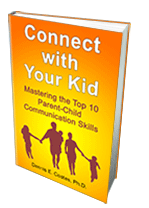In Chapter 4 of my book, Connect with Your Kid: Mastering the Top 10 Parent-Child Communication Skills, I place special emphasis on the skill, “Listening to Understand.” The main reasons is that a parent’s ability to listen well is crucial in so many situations.
These “listening moment” opportunities arise when:
- Your child is trying to tell you something.
- Your child is struggling with a problem.
- You notice your child is experiencing strong emotions.
- What your child wants conflicts with what you want.
- Your child replies to a question you’ve asked.
- Your child’s opinion or perspective doesn’t align with your own.
- Your child has a defensive reaction to your feedback.
- Your child suggests an idea that causes concerns.
Situations like these (and many more) could trigger your own authoritative or negative reaction. While this is a natural parental instinct, human nature so to speak, it likely would create resentment. As children grow up, unproductive interactions can cause a child to want to distance themselves from you. The bond between you could weaken, or worse.
Always the best response is to listen to understand. It’s probably the most powerful skill a parent can have. I often refer to it as “magical” because of its instantaneous beneficial effects.
Of course improving your ability to listen takes determination, practice and patience. But you can do it. And a key element of the skill is recognizing when you need to stop yourself from “reacting” and instead focus on listening — what I call “listening moments.”

